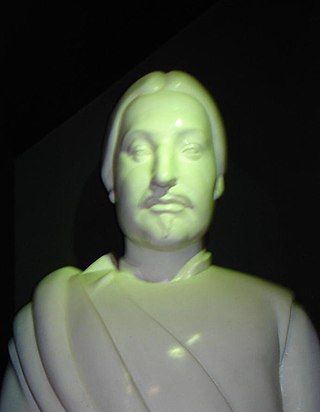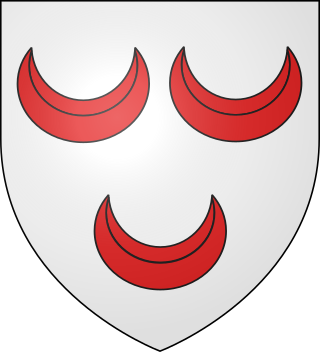Related Research Articles

Year 1307 (MCCCVII) was a common year starting on Sunday of the Julian calendar.

The Wars of Scottish Independence were a series of military campaigns fought between the Kingdom of Scotland and the Kingdom of England in the late 13th and 14th centuries.

Edward Bruce, Earl of Carrick, was a younger brother of Robert the Bruce, King of Scots. He supported his brother in the 1306–1314 struggle for the Scottish crown, then pursued his own claims in Ireland. Proclaimed High King of Ireland in 1315 and crowned in 1316, he was eventually defeated and killed by Anglo-Irish forces of the Lordship of Ireland at the Battle of Faughart in County Louth in 1318.

The Battle of Falkirk, on 22 July 1298, was one of the major battles in the First War of Scottish Independence. Led by King Edward I of England, the English army defeated the Scots, led by William Wallace. Shortly after the battle Wallace resigned as Guardian of Scotland.
Humphrey (VII) de Bohun, 4th Earl of Hereford was a member of a powerful Anglo-Norman family of the Welsh Marches and was one of the Ordainers who opposed Edward II's excesses.
Robert de Brus, 6th Lord of Annandale, jure uxoris Earl of Carrick (1252–1292), Lord of Hartness, Writtle and Hatfield Broad Oak, was a cross-border lord, and participant of the Second Barons' War, Ninth Crusade, Welsh Wars, and First War of Scottish Independence, as well as father to the future king of Scotland Robert the Bruce.

William II, Earl of Ross was ruler of the province of Ross in northern Scotland, and a prominent figure in the Wars of Scottish Independence.
The Battle of Inverurie, also known as the Battle of Barra, was fought in the north-east of Scotland and was a victory for the Scottish king Robert Bruce over his chief domestic enemy, John Comyn, 3rd Earl of Buchan. Though part of the wider Wars of Scottish Independence, it is more properly viewed as an episode in a brief but bitter civil war. It was followed by the Harrying of Buchan, a violent act of destruction of property long remembered with bitterness in Buchan. The battle was fought in May 1308 according to Fordun. However, Barbour states clearly that it was fought at Christmas of 1307. Many current historians accept Fordun's date, but Barron and some others believe that Bower misinterpreted Fordun's notes. The battlefield was added to the Inventory of Historic Battlefields in Scotland in 2011.
Events from the 1300s in England.

Sir Gilbert de la Hay, fifth feudal baron of Errol in Gowrie, was Lord High Constable of Scotland from 1309.
The Harrying of Buchan, also known as the Herschip (hardship) or Rape of Buchan, took place in 1308 during the Wars of Scottish Independence. It saw vast areas of Buchan in northeast Scotland, then ruled by Clan Comyn, burned to the ground by Robert the Bruce and his brother Edward, immediately following their success at the Battle of Barra.

Sir David de Brechin was a Scottish knight who fought on both sides during the Wars of Scottish Independence.

Sir William de Monte Alto of Ferne, also known as William de Mohaut (d.1327) was a 13th-14th century Scottish noble.
Sir Hugh de la Haye of Locharwart, was a 13th-14th century Scottish knight.

Sir Alexander Lindsay, Lord of Barnweill, Byres and Crawford, also known as Alexander de Lindsay, was a Scottish noble.
David de Berkley of Cairns/Carny was a 13th-14th century Scottish noble.

Sir Patrick de Graham, Lord of Kincardine was a 13th-century Scottish noble and soldier.
Sir Nicholas de la Haye, Baron of Errol, was a 13th-14th century Scottish noble.
William Wiseman, Sheriff of Elgin (1304-1305) was a 13th-14th century Scottish nobleman. He was a soldier during the First War of Scottish Independence.

Sir William de Fenton, Lord of Baikie and Beaufort, was a 13th-14th century Scottish noble.
References
- Barron, Evan Macleod (1914). The Scottish war of independence; a critical study by Evan Macleod Barron. J. Nisbet.